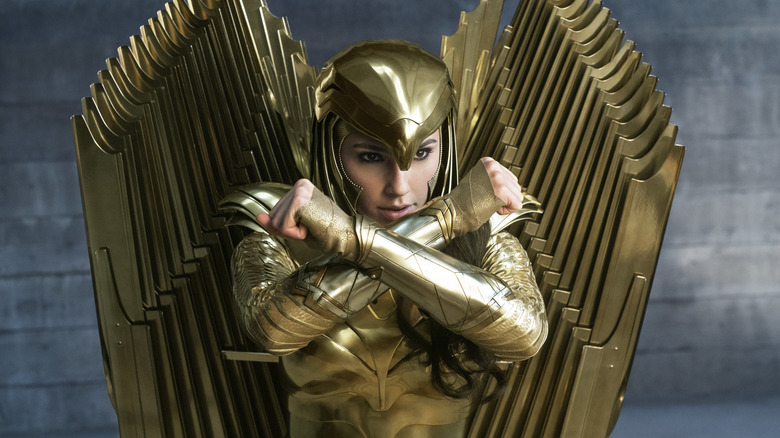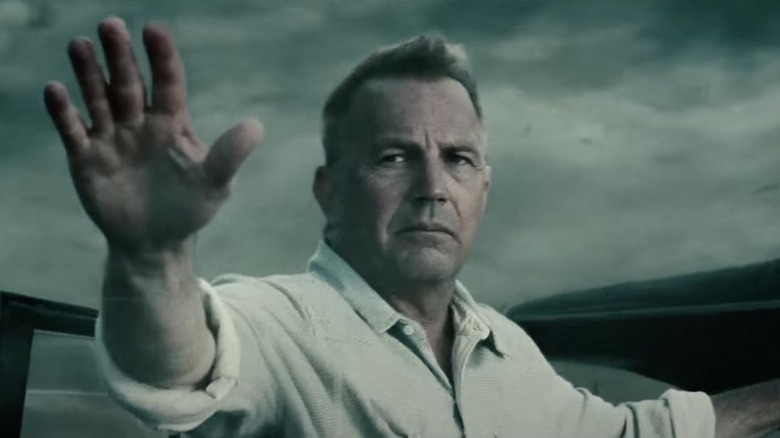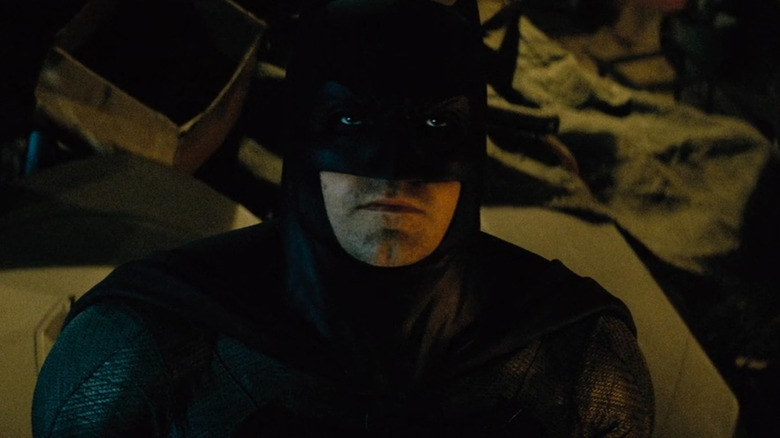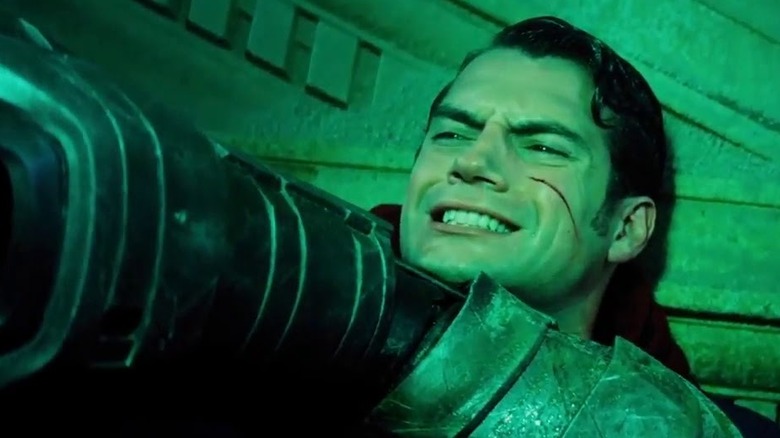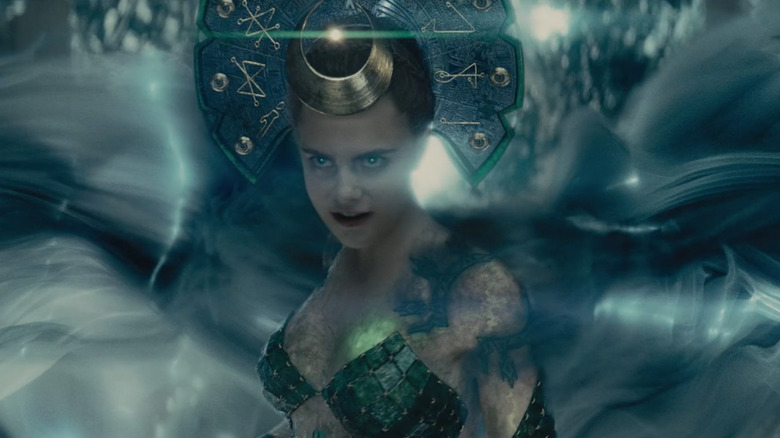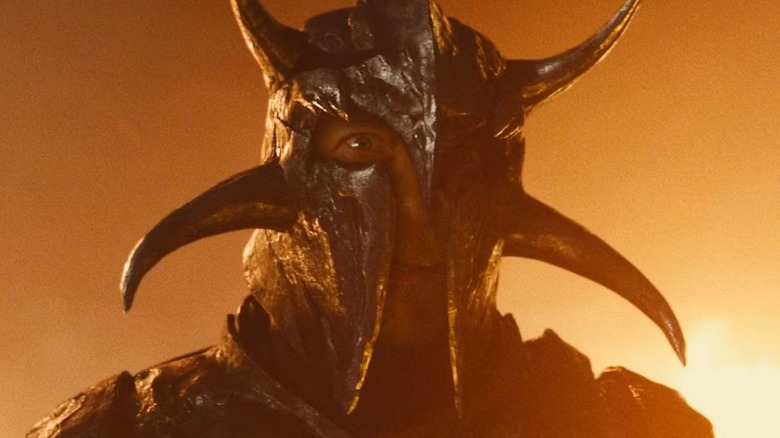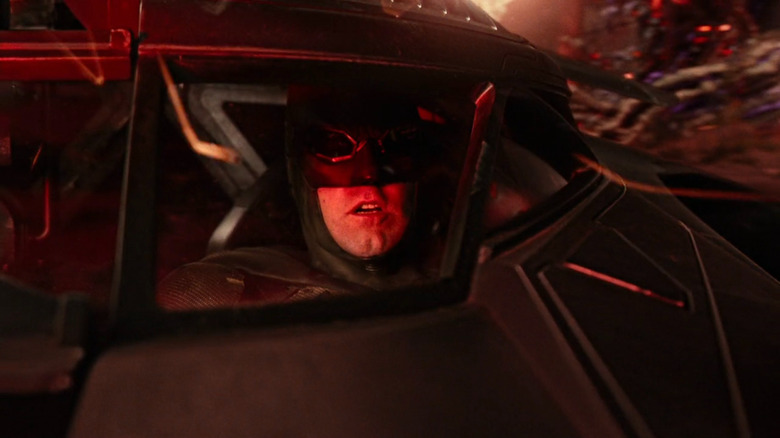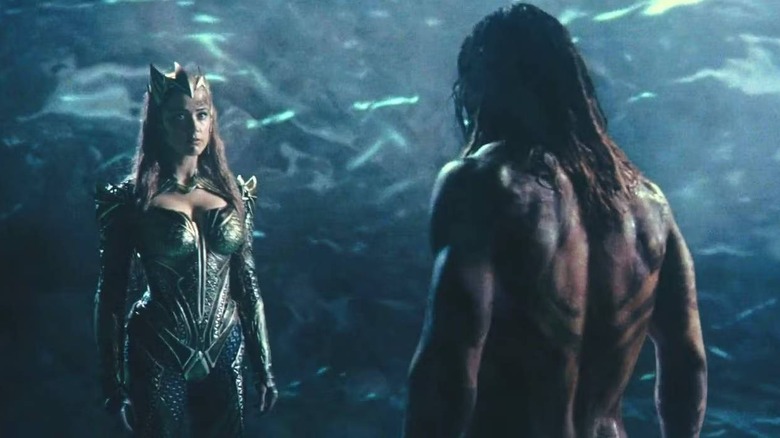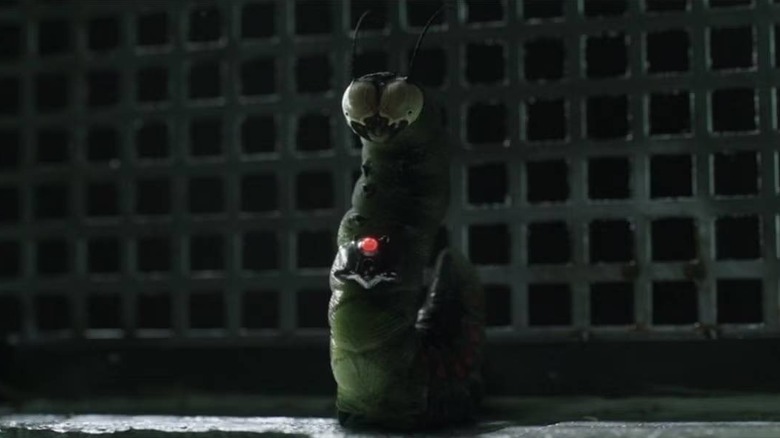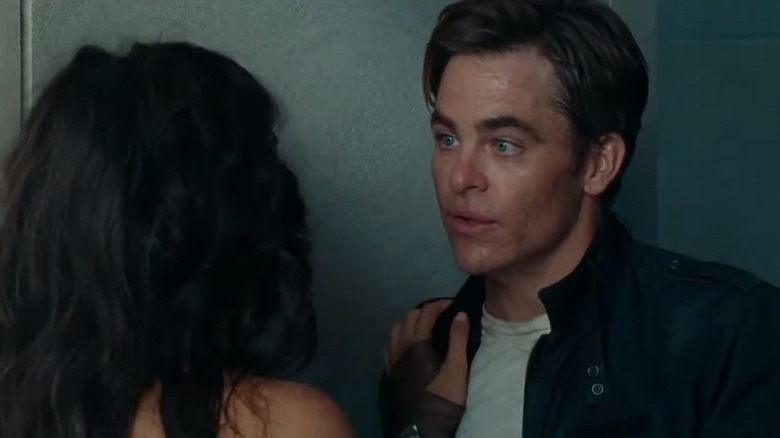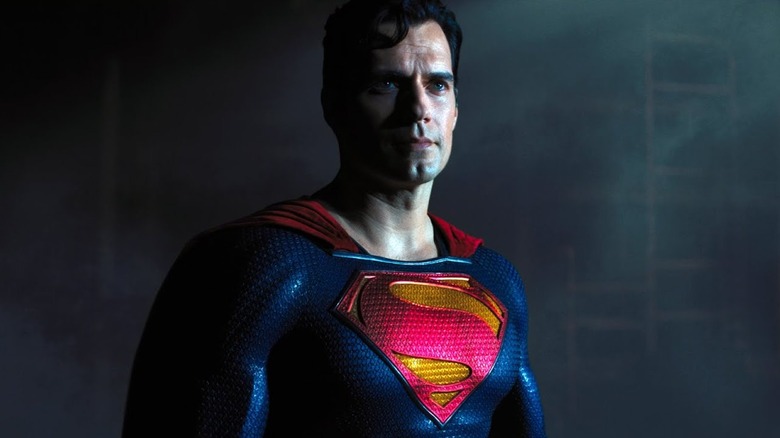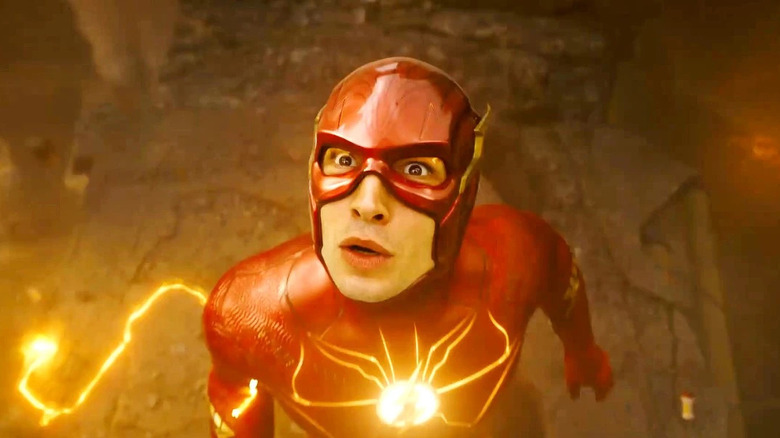Dumb Things We All Ignore In The DCEU
In 2013, Warner Bros. released "Man of Steel," a gritty take on the Last Son of Krypton in the vein of Christopher Nolan's "Dark Knight" trilogy. Nolan's movies were all the rage, and they just so happened to coincide with Phase 1 of the Marvel Cinematic Universe, with "Batman Begins" coming out the same year as "Iron Man." In 2012, "The Dark Knight Rises" brought the trilogy to a close while the MCU was just getting things started with the release of "The Avengers," showing how superheroes from solo movies could all get together to make boatloads of cash at the box office.
All of this is to say that DC heroes got to the party a little late. Instead of focusing on another solo Superman (Henry Cavill) sequel, Warner Bros. went full speed ahead trying to play catch-up with "Batman v. Superman: Dawn of Justice," which crams Batman (Ben Affleck), Wonder Woman (Gal Gadot), and other heroes into a storyline that just feels too convoluted. A pattern would soon take hold, with many films within the DC Extended Universe receiving mixed reviews from critics at best. Some would be financial successes, but for the better part of a decade, DC played second fiddle to Marvel on the big screen.
In hindsight, the DCEU is kind of fascinating. But rewatching all those movies also reveals a lot of baffling decisions. This isn't unique to DC, as the MCU has made plenty of dumb choices as well. Hopefully, the new DC Universe starting with 2025's "Superman" avoids making as many dumb decisions as the old DCEU.
Man of Steel: Clark totally could've saved Pa Kent
"Man of Steel" clearly wants to take a grounded approach to an alien who derives his powers from the sun. In this case, Clark Kent's parents are scared of what could happen to him if the world finds out about his abilities. That's understandable to a degree, but it doesn't make Jonathan Kent (Kevin Costner) admonishing his son for saving a school bus full of kids any less baffling. After that comes arguably one of the worst things in all of "Man of Steel" when Jonathan Kent is stuck in the path of an oncoming tornado and stops Clark from saving him, sacrificing his life so that no one would know Clark is a Kryptonian.
Jonathan's decision is nothing short of stupid. He's concerned about the world learning about Clark, but he already saved a bus of kids and no one was able to put two and two together. There are other people in the vicinity, but with super speed and jumping (he can't fly yet after all), one can imagine Clark could swiftly grab his father and take him to some far off location. The tornado makes for a good distraction, after all.
There's a reason why Jonathan usually dies by heart attack in the comics. It's something even Superman can't save him from, proving there are limitations on who he can and can't save. But Clark could've saved Jonathan here and just ... didn't.
Batman v Superman: Why didn't Batman kill Joker?
After losing his Robin, Batman goes full murder mode in "Batman v. Superman: Dawn of Justice." He has zero qualms about using guns and killing people, which are things he's typically against. This alone angered a lot of people as mischaracterizing Batman, but for the sake of argument, let's say all of that makes sense. His son was killed, so he goes a little nuts. But if we are to accept that the version of Batman portrayed in "Batman v. Superman" is one okay with killing, why doesn't he take out the Joker (Jared Leto)?
He still has Robin's suit hanging in the batcave with "Joke's on you Batman" graffitied onto it. The Joker killed Robin, so if he were to embrace his homicidal instincts, wouldn't Joker be first on the list? What makes something like the 2010 animated film "Batman: Under the Red Hood" so captivating is that even after suffering such an immense loss, it takes every ounce of Batman's being not to break his code and end Joker's life. It's even more confusing that Batman's willing to team up with Joker in the Knightmare sequence of "Zack Snyder's Justice League."
Batman kills numerous nameless thugs. He wants to kill Superman initially rather than risk him potentially turning evil. But Joker is evil through and through, and Batman leaves him be.
Batman v Superman: Superman needed to learn how to use his words
We apologize for continuing to relitigate the "Martha" scene from "Batman v. Superman: Dawn of Justice," but it's really a bad scene. It's a perfect example of "Good concept but poor execution," as the intent is naturally to get Batman to see Superman as human just like him, even if he's an alien. He has a mother he wants to save, just like Bruce Wayne would want to save his mother if she were still around. But the moment comes across as silly because Superman just says "Save Martha," as though that would mean anything to Batman, who proceeds to yell, "Why would you say that name!?"
For starters, it seems like Superman could've tried using his words sooner. Even though Batman has a Kryptonite spear, Superman could've tried rationally explaining how Lex Luthor (Jesse Eisenberg) has Martha Kent (Diane Lane) hostage, and that could've more clearly shown Batman how he cares about his family. Besides, was Batman supposed to know specifically which Martha to try to save? All Superman says is "Save Martha," but one would imagine there are a lot of Marthas around, so where exactly is Batman supposed to start looking for one?
The exchange also begs the question as to whether Bruce Wayne reacts like this any time he hears "Martha" in the wild. Would watching "The Martha Stewart Show" trigger him?
Suicide Squad: Why did Amanda Waller need a clown to beat a witch?
There are plenty of dumb things in 2016's "Suicide Squad" to make fun, from the copious needle drops to cringey dialogue like, "We some kind of Suicide Squad?" It's almost enough to make you forget that the central conceit of the film just doesn't add up. Amanda Waller (Viola Davis) forms Task Force X, a collection of supervillains to carry out government missions. When Enchantress (Cara Delevingne) takes over Midway City and threatens the entire world, the squad is sent in to rescue Waller before they go off of their own accord to stop Enchantress.
If Waller needed to be extracted, she could've just called in more army guys instead of deranged criminals. Plus, Waller didn't ask the squad to stop Enchantress, so what was the plan to deal with her? It didn't seem like anyone else was coming, so if the squad just decided to continue being selfish, Enchantress conceivably could've done a lot more damage.
The Suicide Squad works best when they're conducting black ops missions where it doesn't matter if most or all of them get killed. Plus, they do things the government doesn't want to be affiliated with. It makes far more sense for Waller to call upon the military and/or actual superheroes to rescue her and deal with Enchantress. And even if Waller really wants to use Task Force X, why pick the weakest villains out there? El Diablo (Jay Hernandez) is the only one with superpowers while Harley Quinn (Margot Robbie) has a mallet, Deadshot (Will Smith) can shoot real good, and Captain Boomerang (Jai Courtney) throws, well, boomerangs. She really needed someone like Killer Frost or Poison Ivy on the team to even the odds.
Wonder Woman: Does Ares control war or not?
Ares (David Thewlis) is a natural antagonist for Wonder Woman, as she seeks to bring peace to the world, and he's an agent of war. Upon hearing about the Great War from Steve Trevor (Chris Pine), Diana becomes convinced Ares is behind it and seeks to stop him. But when the two finally battle, he tells her that he's not responsible for war, at least not directly. While he can influence humanity, humans ultimately have a dark nature all on their own, and they would fight even without him. It's a nuanced way to look at morality that challenges Wonder Woman's preconceived notions, but the aftermath of their fight seemingly undoes all of this.
After Diana kills Ares, soldiers emerge from the rubble completely willing to put the war behind them. This makes it seem as though Ares is, in fact, controlling people, and the "spell" was broken upon his death. The soldiers immediately go from wanting to fight to ready to surrender, and that lets them off the hook too easily. It would make more sense for soldiers to emerge from the rubble, perhaps wanting to fight initially, but Wonder Woman has to make yet another plea for them to put this madness behind them. It would still show how humans naturally have darkness in them, but they can always make the choice to do better.
Justice League: Batman didn't need to use himself as bait
2017's theatrically-released "Justice League" is a chopped-up mess of a film, and while there's no shortage of things to poke holes through, the strangest might be Batman wanting to sacrifice himself for no reason. As the team prepares to face Steppenwolf (Ciarán Hinds), Batman determines there are too many parademons for all of them to mow through. He decides to lead the parademons away, using himself as bait within the Batmobile, so that the rest of the Justice League can take on Steppenwolf.
For being such a supposed brilliant tactician, this is a huge miscalculation on Batman's part. For starters, the league goes to save Batman anyway, because of course they do. And it turns out they can take on a horde of parademons, but in the process, they lose the ability to get the jump on him. Steppenwolf is now aware of the League's presence and can anticipate their next move more carefully than if they just decided to attack him outright in the first place.
Even if Batman thought it was the right move in the moment, why was he so willing to die in the process? Before Superman comes back, the League only have five members, and it would've been four without him. It's a dumb decision that throws into question Batman really being a genius after all.
Aquaman: No continuity between Arthur and Mera
With interconnected cinematic universes, it's easy for details to get lost between the directors and writers for each film. Some inconsistencies are to be expected, but "Justice League" and "Aquaman" have an Atlantis-sized plot hole between them.
In "Justice League," Steppenwolf attacks Atlantis for a Mother Box, forcing Aquaman (Jason Momoa) to travel there. He also speaks with Mera (Amber Heard), so it's clear the two know each other. However, "Aquaman" takes place one year after the events of "Justice League," and Arthur Curry has seemingly never been to Atlantis before. He trained with Vulko (Willem Dafoe) as a child, as seen through flashbacks, but it takes Mera to show him the Gateway into Atlantis where he acts like it's his first time ever there.
How did Aquaman get to Atlantis in "Justice League" if he needed Mera to show him the only path a year after those events take place? What's even more bizarre is that after Arthur tries to escape from Orm (Patrick Wilson), he doesn't know his way out of the city even though he left completely of his own accord in "Justice League." "Aquaman" seems to want to be more of a straightforward origin story despite "Justice League" establishing him as a known quantity in Atlantis, and the result is a messy continuity error that just makes Arthur look like he's suffering from memory loss.
Shazam: Mister Mind goes nowhere
There's no shortage of bizarre post-credits scenes that failed to live up to the hype, but the ones featured in the "Shazam!" movies are pretty unforgivable. "Shazam!" ends with Sivana (Mark Strong) in a prison cell and then meeting the talking caterpillar, Mister Mind. It stands to reason that his introduction here means he would be the main villain for "Shazam! 2" but, alas, that would make too much sense.
When "Shazam! Fury of the Gods" came out, the bad guys were instead Hespera (Helen Mirren) and Kalypso (Lucy Liu), the daughters of Atlas. This ties "Shazam!" into more of the Greek mythological side of the DCEU, helping to explain the weird Wonder Woman cameo at the very end, but sadly, no Mister Mind. Strangely, the bug is relegated to yet another post-credits scene for "Shazam! 2," where he once again talks a big game but does nothing.
"Fury of the Gods" came out after it was announced James Gunn and Peter Safran would reboot the DC cinematic universe (shortened to DCU) and "Shazam! 3" wasn't on their list of films for the new franchise. It was probably safe to assume "Shazam! Fury of the Gods" was the end of the line for this iteration of the character, and they likely shouldn't have ended with a promise of Mister Mind mayhem knowing it would never come to fruition.
Wonder Woman 1984: The wish rules make no sense
"Wonder Woman 1984" introduces the Dreamstone, an artifact that grants a person's wish while taking something away from them. It's classic "monkey's paw" logic, but throughout the film, the Dreamstone rules become increasingly muddled. For starters, Diana wishes for Steve Trevor to come back after he died in World War I. He does return, but it's not actually Steve. Diana effectively sees his essence in the body of another man, who must go into some kind of limbo state while Steve occupies his body. Steve doesn't really return, so Diana technically doesn't have her wish fulfilled. And before you assume that's the negative consequence to her wish, she also begins losing her powers. Therefore, the Dreamstone doesn't even really fulfill her wish, yet it takes something away from her regardless.
Despite the Dreamstone only granting one wish for one person, Barbara Minerva (Kristen Wiig) gets two wishes. The first is to become strong, sexy, and cool like Diana, and later, she wishes to be an apex predator, which is an odd way of phrasing being powerful, but we suppose she needs to phrase it like that to become Cheetah.
Plot consistency can get dicey when magic's involved, but this really seems like something that should've had straightforward rules. A character gets their wish, but it comes at a price. That's easy enough to follow, but Diana and Barbara's wishes contradict this and make the whole thing muddier than it needs to be.
Black Adam: Why does Black Adam pick a fight with Superman?
Black Adam (Dwayne Johnson) is a complex comic book character who will occasionally do the right thing if it serves his interests, but also isn't above some diabolical acts. In the film "Black Adam," this mostly boils down to him being a good guy who kills some enemies. And since he's trying to do the right thing by Kahndaq, it makes the infamous post-credits scene pretty confusing.
"Black Adam" ends with the titular character wanting to rule over Kahndaq as a protector, not a dictator. This seems nice enough, and he doesn't give any indication he wants to seek out and conquer other lands. That doesn't stop Amanda Waller, however, from sending a drone to threaten him to stay in Kahndaq or face consequences. Those consequences are seemingly Superman, who shows up to put Black Adam in his place.
It doesn't add up for Black Adam to antagonize Waller when all he wants to do is stay in his lane, which Waller seems fine with. As with many dumb things in the DCEU, this conflict could've been avoided had Black Adam used his words to explain he has no intention of leaving Kahndaq and just wants to keep his people safe. Another odd thing about this interaction is Superman showing up at all. Is he working with Waller? How else would he have known to show up at that very moment? If everyone would just leave Black Adam alone, he's a non-threat.
The Flash: He never learns a lesson
After taking a decade to make it to the big screen, 2023's "The Flash" proved to be a fairly middling affair with embarrassing CGI moments. All that could be forgiven if the story was halfway decent, but the film ends with Barry not even learning the central lesson of the "Flashpoint Paradox" storyline.
The movie sees Barry Allen (Ezra Miller) travel to the past to save his mother, creating a ripple effect that leads to General Zod (Michael Shannon) threatening an Earth with no Superman. He realizes the only way to protect the planet is to go back to ensure his mother dies, an emotional moment of Barry sacrificing what he wants for the greater good. However, he makes a slight detour during the climax to make it so that his father's face is seen on security cameras at the grocery store, giving his father an alibi to prove he didn't kill his wife, keeping him out of prison.
The whole point of "The Flash" is that even if you wish things in the past could be different, you should be thankful for how they are. But Barry ignores this so that he at least gets one parent in his life, and this also changes things as the new Batman in his reality looks like George Clooney instead of Ben Affleck. It seems like he's okay living in this new reality since it's mostly the same, but it completely undermines the movie's moral.
